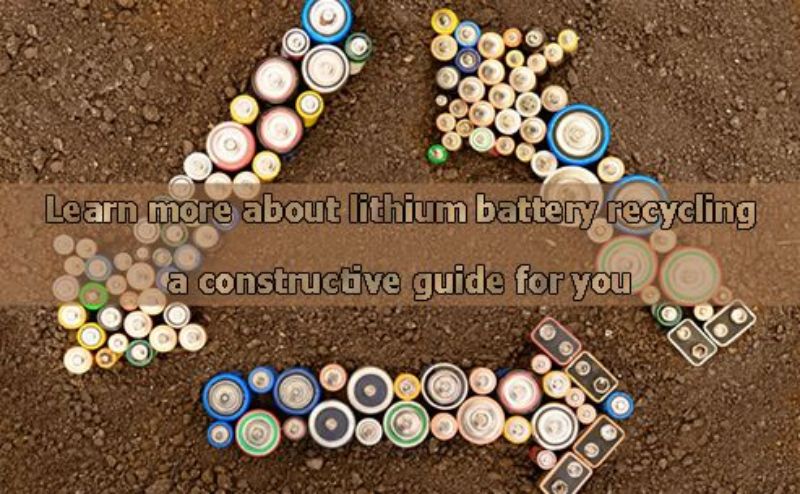
Main content:
- 1.Will we run out of lithium? How do you dispose of old lithium batteries?
- 2.What happens to lithium batteries when recycled?
- 3.How do lithium-ion batteries get recycled? What are the best ways of lithium battery recycling?
- 4.Why is it difficult to recycle lithium batteries? What are the problems to be paid attention to in lithium battery recycling?
- 5.Are lithium batteries hazardous waste? Is lithium battery toxic to the environment?
- 6.Is lithium battery recycling profitable?
Lithium ion batteries are widely used in electric cars, electric scooters, smartphones, digital cameras and electric wheelchairs, such as mobility scooter batteries. They are a new technology that replaced lead acid batteries, and people's demand for Li-ion batterie is climbing year by year, the development of lithium battery recycling is increasingly paying attention to. By reading this article, you’ll get to understand more about lithium battery recycling.
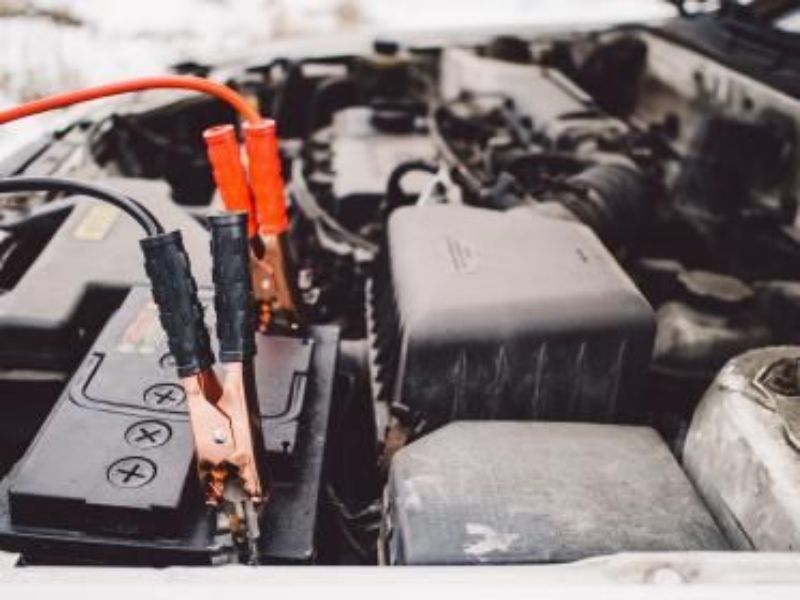
1.Will we run out of lithium? How do you dispose of old lithium batteries?
Right now the problem does not lie in the quantity of lithium. The demand of lithium is not that much high that we’ll run out of it in the next decade. The main concern is that how fast it can be extracted. Current framework of mining lithium is equipped in such a way that it handles less amount of production, which means this sudden increase in demand of lithium might have companies struggling.
But recently the supply of upstream lithium salts has been tight and the price has continued to rise. Therefore, producers are developing more lithium ore. Which means the demand for lithium is more than its supply, the extremely high demand for lithium in recent years has caused a huge rise in lithium ion battery prices. In addition, the demand of EV vehicles is increasing day by day, so it provides an opportunity for the lithium producers to earn heavy profit. But unfortunately EV vehicles become less affordable as the prices of lithium go up. And then there is fundamental problem that lithium will one day run out. As we’ll begin to rely on lithium too much.
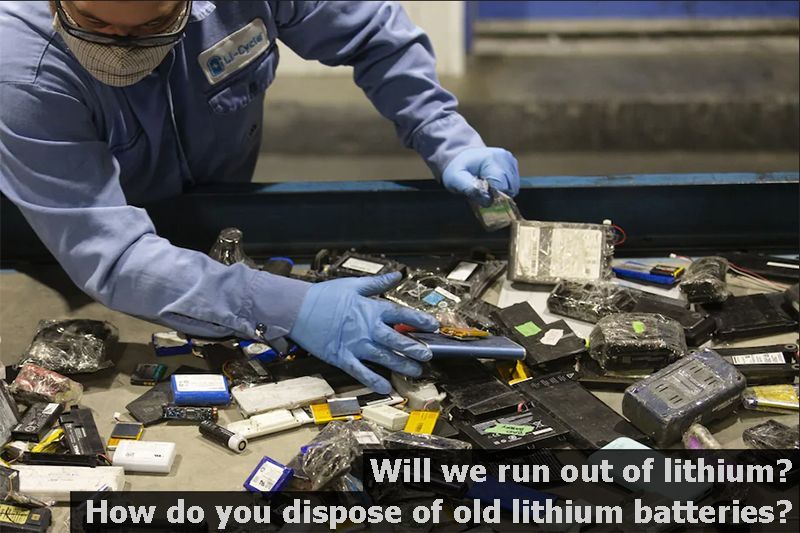
One likely solution is lithium battery recycling instead of discarding it in the trash. Lithium battery recycling not only reduce the environmental pollution caused by used batteries but also brings many social benefits. By recycling ,the value able components in the waste batteries can still be utilized to generate great economic effects. There was a concern among producers of lithium ion batteries that recycled product may be lower in quality as compare to new one. Leading to shorter battery life. But according to recent research that the batteries made with the recycled cathode material perform just as well as those made originally.
2.What happens to lithium batteries when recycled?
Given the widespread use of lithium-ion batteries, there is a need to recycle and reuse their constituents. In addition, spent lithium-ion batteries typically contain 5-20% cobalt (Co), 5-10% nickel (Ni), 5–7% lithium (Li), 5–10% other metals (copper (Cu), aluminum ( Al), iron (Fe), etc.), considering the economic value of high nickel, copper or cobalt content, it is also very necessary to carry out lithium-ion battery component recovery.
After lithium battery recycling many cathode materials with still usable form can be recovered from it. Lithium ion batteries contain high concentration of manganese and cobalt along with lithium. These are valuable resources with high recycling value. So when lithium ion battery is recycled these high quality material can be recovered. Simultaneously, recycling lithium battery reduces dependency on primary raw material.
3.How do lithium-ion batteries get recycled? What are the best ways of lithium battery recycling?
Lithium ion batteries have complex structure and contain variety of materials. Therefore they must be pretreated with a variety of processes. This Increases the efficiency of recovery and also reduces the power consumption. Pretreatment includes several steps of sorting, discharging, dismantling, crushing, mechanical separation, etc., followed by metal extraction, metal recovery and metal reuse. There are three environmentally friendly methods for lithium battery recycling, including mechanical, thermal, or chemical methods.
①Pyrometallurgy
In this method of lithium battery recycling the metal oxides used in the battery are converted into metals or compound metals by heat. After pretreatment metal oxides are converted into mixed metal alloy having cobalt, iron, copper, nickel, iron and slag having aluminum and lithium in it by heating the materials in the vacuum. In order to prepare batteries for recycling pyro metallurgical methods require pretreatment method and some other methods for lithium ion battery recycling. Pyro metallurgical methods are suitable for recycling precious metals such as cobalt but lithium is also recyclable by these methods. Advantages of this method include flexibility and less time consumption. Main disadvantage of this method is that in this method the loss of material is high, more toxic gases are released and more energy is consumed.
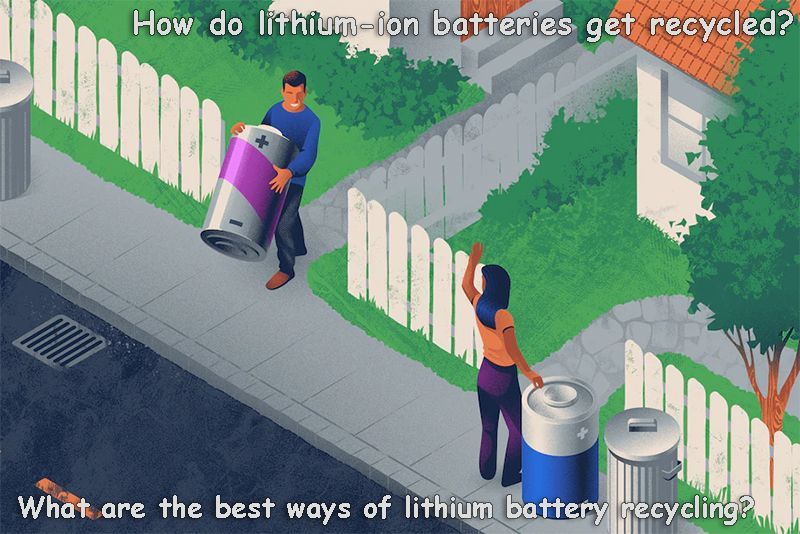
②Hydrometallurgy
Hydrometallurgical methods employ the use of different aqueous solutions to separate different metals from the lithium ion battery. The materials of lithium ion battery are pretreated and mostly are extracted with sulphuric acid and water but hydrochloric acid, nitric acid, citric acid and oxalic acid are generally used.After the extraction of metals into the solution they are separated in the form of precipitates using pH variation. They can also be extracted by organic solvents having specific functional groups. The advantages of Hydrometallurgy is that this method has ability to recover the metals effectively with high degree of purity, less energy consumption and less emission of toxic gases.
③Physical and Mechanical
This process reduces the magnitude of residue by removing battery’s outer shell and separating important materials. The material once recovered undergo physical separation methods which include crushing, screening, filtration and agnetic stirring. To separate one element from another mechanical separation of the materials is done.
4.Why is it difficult to recycle lithium batteries? What are the problems to be paid attention to in lithium battery recycling?
Lithium battery recycling is a complex process. Very few recycler know how to effectively control and treat huge variety of pollutants associated with the battery. Therefore less than five percent of used lithium batteries are recycled today. Lithium ion battery comprises of two electrodes cathode and anode. These two electrodes are separated by a micro perforated separator and can store high amount of energy.

Lithium ion battery releases this stored energy slowly over long time period, but when all of the energy is released at the same time, the perforated separator fails, the two electrodes collide with each other which causes thermal runway. Thermal runway initiates uncontrollable chain reaction, the temperature of the battery rises rapidly, battery becomes gaseous and catches fire which can hardly be quenched.Specific methods are required to transport, store and recycle lithium batteries. Which means organizations should not send these batteries to the recycler that does not have sophistication to process them safely.
There is also absence of governmental laws and regulations in regard to lithium battery recycling in some countries. Other issues include insufficient disposal points, high operating cost, toxicity of solvents used in the extraction of metals, air pollution and damage to the environment through the discharge of acids to the rivers. Government should focus on creating laws and regulations regarding recycling of lithium batteries. The producers and consumers should follow these rules to minimize the harmful effect of the recycling. The recyclers should adopt a design for recycling approach.
5.Are lithium batteries hazardous waste? Is lithium battery toxic to the environment?
Abandoned lithium batteries belong to general solid waste, not hazardous waste. Lithium-ion batteries do not contain toxic and harmful components and are less harmful to the environment as compared to other batteries., therefore they are relatively environmentally friendly and termed as non-hazardous.
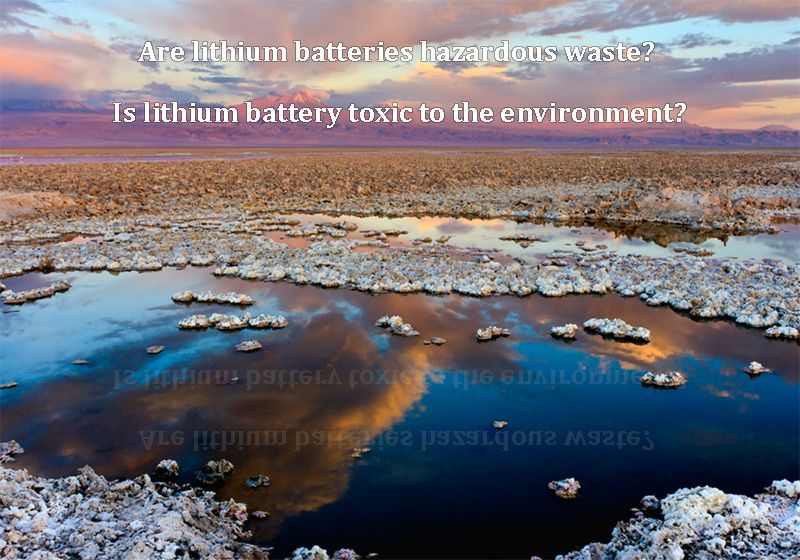
6.Is lithium battery recycling profitable?
The lithium battery recycling process is supposed to be highly profitable. It’s estimated that about 125,000 metric tons of lithium can be recovered from used lithium batteries.